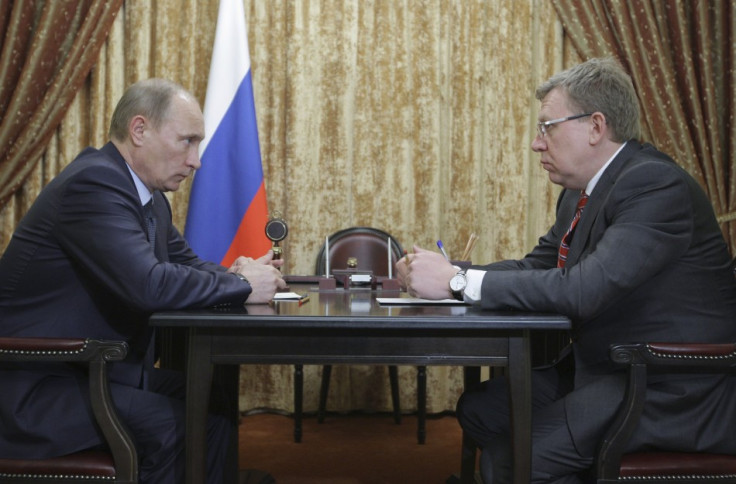Former Russian Finance Minister Alexei Kudrin Warns Putin Over 'Populist' Policies

"Excessive conservatism" will weaken Russia's economy, President Vladimir Putin has been warned.
The former Finance Minister Alexei Kudrin has said that pursuing such populist policies could make Russia less attractive to investors and will lead to widespread distrust in the rouble, among foreign currency investors.
"If the president relies only on populist approaches, the country will continue to weaken, and will lose economic growth opportunities," Kudrin wrote in the Vedomosti business newspaper. "It is necessary to avoid excessive conservatism, which limits individual and economic freedom, hinders development."
Kudrin was finance minister until 2009, when he quite over perceived excessive military expenditure. He warned that the ongoing crisis in Ukraine, coupled with the retaliatory sanctions imposed by the west which have frozen Russian companies from Europe's financial markets, will continue to hurt the Russian economy for as long as they remain in place.
"Formal and informal sanctions have already seriously impacted the Russian economy. Bringing back the previous opportunities when it comes to foreign investment and trust in the rouble can be achieved only within seven to 10 years of growth of our economy," he said.
Amid falling oil prices and a lack of international finance, the Russian oil giant Rosneft has asked for a $48bn financial package from the National Wealth Fund, a move which Putin last week endorsed in a wide-reaching interview in the Russian media. However, Kudrin has criticised this move.
Kudrin has been unusually vocal about the impact of sanctions and the ongoing turmoil in East Ukraine. In September, he warned that the sanctions could result in years of economic stagnation.
"There will be stagnation, like now. There could be recession. We will be balancing on the edge of recession all the time," he told a Reuters summit in Moscow.
He warned that even if there is no extension on Western sanctions on Russia, the economy looks set to lose 1% of growth for the next three years, at least.
"Today the decline of Russian economic growth is not so much the result of sanctions as of the lack of reform of the economic system, at a time when the oil price is not rising but falling. We need another economic model," Kudrin said, criticising the Russian state's model to "temporarily not observe the rules of the World Trade Organisation", which it joined in 2012.
He urged the Kremlin to look at rebalancing the Russian economy away from its dependence on oil and gas exports to the West, looking to new resources in the Arctic and Far East. He also warned the process may be hampered by a Western ban on the import of hi-tech energy equipment.
Kudrin said Russia should pursue a relationship with China but not at the expense of the West, upon which it relies for innovative technology.
He said: "We could make a mistake if we only see a Chinese [policy] vector. We need to understand that for at least 20 to 30 years, we will continue to receive basic technologies from the West."
Meanwhile, analysts have warned that falling domestic demand is compounding Russia's exports crisis.
"One of the most striking aspects of the recent slowdown in the Russian economy is that the previously resilient consumer sector has weakened sharply. And while this may in part be a result of spillovers from the Ukraine crisis, we think there are more fundamental reasons behind the weakening of consumer spending.
"Accordingly, it is likely to remain extremely weak over the coming years, providing a much smaller prop to growth than it did over the past decade," wrote Liza Ermolenko of Capital Economics in a note.
© Copyright IBTimes 2025. All rights reserved.






















